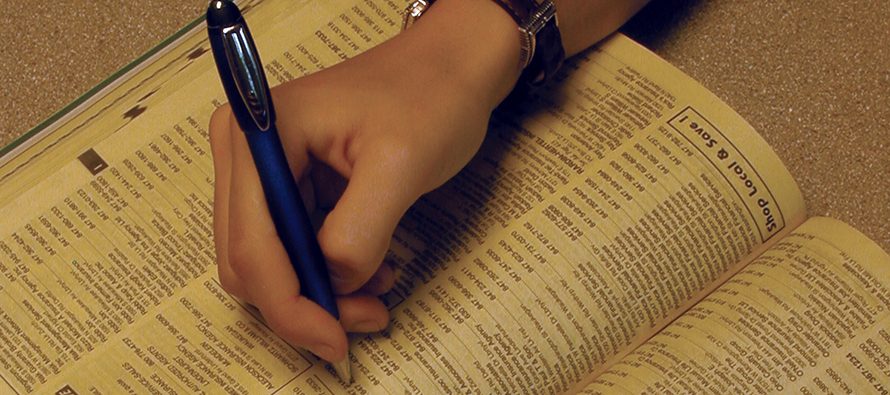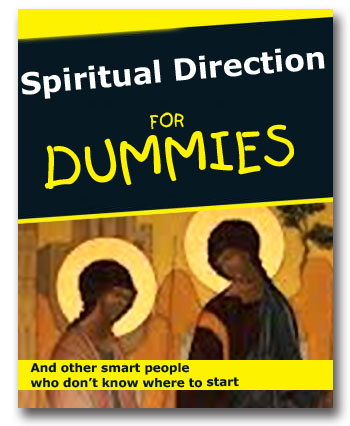Spiritual direction for dummies (and other smart people who don’t know where to start)

One of the first things I recommend to a man considering joining my religious order, the Jesuits, is that he get a spiritual director and get into spiritual direction. But spiritual direction isn’t only for people considering a religious vocation. It can help just about anyone who is serious about their spiritual journey.
As valuable as it is, spiritual direction is a relatively new practice for many Catholics, and a lot of the time people are mystified by it. Put simply, spiritual direction is an ongoing process of nurturing your spiritual life. Although it is not counseling or therapy, it may have the benefits of healing and spiritual and emotional growth. Here’s a basic overview of how it works.
Imagine that I’m the one seeking spiritual direction. First, I must find and ask someone to be my spiritual director. Going to the Yellow Pages in search of a spiritual director will likely turn up a list of psychics under the heading Spiritualists. So where do I turn?
 I might ask for a referral from a vocation director, campus minister, priest, sister, lay minister, or another person whose judgment I trust. If you’re considering a particular religious order, you might want a spiritual director from that order because he or she would be familiar with its approach to spirituality. Another option would be to contact a Catholic retreat house and ask the director there if he or she can suggest any spiritual directors in the area. Retreat houses often have websites, as do religious orders and most dioceses. So you can even take your search for contacts into cyberspace.
I might ask for a referral from a vocation director, campus minister, priest, sister, lay minister, or another person whose judgment I trust. If you’re considering a particular religious order, you might want a spiritual director from that order because he or she would be familiar with its approach to spirituality. Another option would be to contact a Catholic retreat house and ask the director there if he or she can suggest any spiritual directors in the area. Retreat houses often have websites, as do religious orders and most dioceses. So you can even take your search for contacts into cyberspace. You could seek referrals through Spiritual Directors International, an association of more than 4,000 spiritual directors who “tend the holy around the world and across traditions”. Work up a list of possible directors. Consider each, and try to determine the one with whom you think you’d be most comfortable sharing all aspects of your life. (Spiritual directors are required to keep their conversations with you confidential.)
The ins and outs of spiritual direction
Once I’ve found a director, we meet regularly, perhaps monthly, for about an hour each time. It’s possible there could be a fee involved, although this is often not an expectation, particularly with those discerning religious life. I tell my director what has been going on in my spiritual life. This includes talking about my prayer life, how I’ve been praying, what’s been going on in my prayer, and whether I’ve felt drawn by the Lord in any particular way.
I might also talk about how I’ve been finding God—or perhaps not finding God—in my daily experiences, such as in my relationships, work, studies, leisure, and other areas. I might talk about my temptations. (Actually, as I recall my earliest foray into spiritual direction, I could have talked about my temptations a lot.) I might talk about what’s going well and what’s not going so well for me. Or about my moral life, how I’ve been living out my faith in practice through volunteer work, being helpful to others, and so forth.
If I were in a vocational discernment process, my spiritual direction would include telling my director how I feel regarding my vocation.
My spiritual director then gives me feedback about what I’ve shared. We might discuss movements or patterns that are appearing in our dialog—what seems to be coming from God and, conversely, what seems to grow out of negative sources.
|
Contacts for finding a spiritual director While looking for a spiritual director, try asking for a referral from your pastor, the director of an area retreat house, or another trusted friend in the church. Retreat houses may also have websites that can help you contact them. Spiritual Directors |
Why do it?
Why is spiritual direction important?
If I’m trying to discern (“figure out”) God’s call to me, I must pay attention to what God is saying to me. For that to happen, I must pray regularly—preferably daily—for an extended period, say a half hour. If that sounds like a lot of time, consider the anecdote in which a spiritual director is asked, “How long should I pray each day?”
“About a half hour,” the director replies.
“A half hour!” comes the surprised response. “I’m not sure I have 30 minutes to pray each day.”
“Then you better pray for an hour,” advises the director.
In prayer, I must pay attention to the patterns I hear in my prayer, the various spiritual movements within me. The guidance of a spiritual director helps me to do these things in several ways.
- Regular meetings add accountability to the discernment process. When I know I will be talking shortly to my spiritual director, I’m challenged to look more carefully at my experiences so that I can articulate to my director what’s been going on in my life.
- In describing my experiences to my director, in a sense I “put my experiences out there” to be looked at together. This helps me more clearly explore my inner experiences, detecting patterns, themes, and movements in my spiritual life.
- My director serves as a companion in my spiritual life and offers support. This is important, because in our secular culture, trying to hear God’s call and lead a life of prayer and faith can be difficult.
- Spiritual direction can also greatly reduce the possibility of self-deception. Saint Teresa of Ávila is alleged to have said: “The person who has himself as a spiritual director has a fool for director! In going it alone, it becomes too easy to misinterpret our inner experiences. Unconscious biases can lure us away from listening to God’s voice. Instead we can end up paying more attention to voices other than God’s, such as the values of our secular culture, family, or friends. Not that family and friends can’t be helpful—it’s just that with spiritual issues, we cannot assume that they will understand us as well or want the same things that God wants for us or that we need for ourselves.
- Finally, a willingness to enter spiritual direction can be a kind of vocation litmus test. Committing myself to these initial basic practices shows I am serious about determining God’s will for me.
Tags
Related
- Questions Catholics Ask: What are the different forms of prayer?
- What does “success” look like in discernment?
- How to find a guide for your vocation adventure
- Beware of bots and bad actors as you engage online
- Call stories to help you discern
- Five reasons to pray the Liturgy of the Hours
- Tune into your prayer life
- Embody your decisions
- Your mission awaits you! Pope Francis' message to young people
- My portable prayer life Read More
Most Viewed
- Find your spirituality type quiz
- Questions and answers about religious vocations
- Celibacy quiz: Could I be a nun? Could I be a brother? Could I be a priest?
- Resources for older discerners or those with physical and developmental differences
- About Vocation Network and VISION Guide

